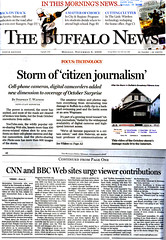I reread this morning Clay Shirky’s great SXSW piece about the media business and i wanted to share some of his thoughts here. Let me go through the end of the article a bit. He starts:
Elizabeth Eisenstein’s magisterial treatment of Gutenberg’s invention, The Printing Press as an Agent of Change, opens with a recounting of her research into the early history of the printing press. She was able to find many descriptions of life in the early 1400s, the era before movable type. Literacy was limited, the Catholic Church was the pan-European political force, Mass was in Latin, and the average book was the Bible. She was also able to find endless descriptions of life in the late 1500s, after Gutenberg’s invention had started to spread. Literacy was on the rise, as were books written in contemporary languages, Copernicus had published his epochal work on astronomy, and Martin Luther’s use of the press to reform the Church was upending both religious and political stability.
I want to draw the obvious parallel to today’s revolution in publishing and in technology. I belive that just having email and IM has increased the literacy in America (maybe the world). Not 15 years ago no kids were daily expressing themselves in written words, now they do all the time. In 1996, i would frequently get emails in ALL CAPS and poorly written. Now it’s a must-have skill. But let’s continue with the speech….
What Eisenstein focused on, though, was how many historians ignored the transition from one era to the other. To describe the world before or after the spread of print was child’s play; those dates were safely distanced from upheaval. But what was happening in 1500? The hard question Eisenstein’s book asks is “How did we get from the world before the printing press to the world after it? What was the revolution itself like?”
Chaotic, as it turns out. The Bible was translated into local languages; was this an educational boon or the work of the devil? Erotic novels appeared, prompting the same set of questions. Copies of Aristotle and Galen circulated widely, but direct encounter with the relevant texts revealed that the two sources clashed, tarnishing faith in the Ancients. As novelty spread, old institutions seemed exhausted while new ones seemed untrustworthy; as a result, people almost literally didn’t know what to think. If you can’t trust Aristotle, who can you trust?
I find this same thing is happening with columnist and journalism. Poor articles just get overlooked or debunked in comments. The threshhold for well researched facts is higher as the audience is double-checking you every step of the way. What happened with Aristotle is happenign today with every sports, politcal, and news writer in the world.
During the wrenching transition to print, experiments were only revealed in retrospect to be turning points. Aldus Manutius, the Venetian printer and publisher, invented the smaller octavo volume along with italic type. What seemed like a minor change — take a book and shrink it — was in retrospect a key innovation in the democratization of the printed word. As books became cheaper, more portable, and therefore more desirable, they expanded the market for all publishers, heightening the value of literacy still further.
Sound familiar to anyone? Can you say BLOG or TWITTER – such a simple concept. Take publishing an article on a web page and shrink it to a blog or 140 characters. What seems like a minor change has some profound responses.
That is what real revolutions are like. The old stuff gets broken faster than the new stuff is put in its place. The importance of any given experiment isn’t apparent at the moment it appears; big changes stall, small changes spread. Even the revolutionaries can’t predict what will happen.
Old stuff is indeed getting broken. Newspapers are gone or going fast. Magazines are next. Paper is being replaced by netbooks, iPhones and Kindles. These devices are embracing different technologies and shorter-form content. This is the real revolution that’s happening in front our face. That Time Magazine you have in your mailbox will be a story you tell your grandkids about, “hey kids, get this, i used to walk to the mailbox and pick up a ‘magazine’ that had stories in it written down, printed once a week and sent to me.” and they will look at you the same way i look at my grandparents when they talk about a world with radio programs only and no TV. Our new world has more content, better content, that is more easily shared and discussed – and it’s a beautiful thing.

![Reblog this post [with Zemanta]](http://img.zemanta.com/reblog_c.png?x-id=a151a3cb-e144-46dd-b47d-f504be677ff2)

![Reblog this post [with Zemanta]](http://img.zemanta.com/reblog_c.png?x-id=dfa570cc-7e2a-44e4-9b0b-5d46f00bd912)

![Reblog this post [with Zemanta]](http://img.zemanta.com/reblog_e.png?x-id=cd9413cb-c2e7-4200-9de4-1940585e075f)

![Reblog this post [with Zemanta]](http://img.zemanta.com/reblog_e.png?x-id=f8c872b0-f02f-4b6c-b1ba-ff0d93957d19)
 they only focus on who scored the points and why one team won. They rarely go into the details of what was happening. They don’t give you a feel of the game. Blogs will tell you straight-up what’s happening. If you don’t watch the game, this is huge. It’s as if you are getting a report from a friend (subjective blog) rather than a robot (objective newspaper).
they only focus on who scored the points and why one team won. They rarely go into the details of what was happening. They don’t give you a feel of the game. Blogs will tell you straight-up what’s happening. If you don’t watch the game, this is huge. It’s as if you are getting a report from a friend (subjective blog) rather than a robot (objective newspaper).![Reblog this post [with Zemanta]](http://img.zemanta.com/reblog_e.png?x-id=30d6baef-6f40-4eb6-9630-153f86b3a344)